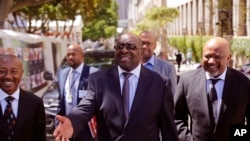South Africa’s finance minister has announced a tax hike for next year, a move that has further annoyed South Africans who say they’re already suffering from a high tax burden, plus the added indignity of irregular basic services. But economists say investment won’t be any more deterred by this tax hike than it is by the nation’s other problems.
South Africa Finance Minister Nhlanhla Nene acknowledged that there is little good news in this year’s national budget.
“This has been a challenging budget to prepare, under difficult economic circumstances,” Nene said week as he spoke before parliament. “The resources at our disposal are limited. Our economic growth initiatives have to be intensified.”
Nene’s task of announcing South Africa’s first tax hike since 1995 is at odds with President Jacob Zuma’s insistence just a two weeks ago that South Africa has a “good story to tell.”
Here’s what the new budget adds up to for the average South African: an across-the-board tax hike of one percent for the middle class and increases in the price of fuel and electricity. All this against a dismal projected economic growth of two percent.
“Instead of taking bold steps to cut wasteful expenditure, annual losses to corruption that run into the billions and a bloated government bureaucracy, the minister decided to foot the over-burdened taxpayers with this bill,” railed a statement from the top opposition party, the Democratic Alliance.
Other analysts noted that South Africans are likely to be annoyed by a fuel price hike, despite falling global oil prices.
But the morning after the speech, many South African economists were anything but dismal about the budget. VOA News spoke to two top economics thinkers in Johannesburg who said the budget was a good effort considering the global economic slowdown.
“Finance Minister Nene appears to have struck the right balance in trying to control government spending, reduce wastage and moderately increase taxation for those who can afford it best,” said economist Kenneth Creamer of the School of Economic Business Sciences at the University of the Witwatersrand. “These interventions are necessary to help to stabilize South Africa’s finances and avoid the dangers of deepening debt.”
Economics lecturer Edward Kodisang at the University of Johannesburg agreed.
“That was a good budget speech from the minister of finance, but with quite a lot of constraints,” he told VOA News. “You’re looking at a South Africa where a majority are unemployed, and the few who are working are subsidizing those who are not working.”
He said although South Africans are unhappy over the tax hike, other African citizens would probably not be deterred from investing or moving here.
“They look at South Africa as a country that can alleviate them from poverty,” he said. “I don’t think the budget speech will impact on Southern Africa. “
Creamer was among the legions of commentators who expressed concern after the President Jacob Zuma’s chaotic state of the nation address earlier this month. That address was interrupted by opposition MPs and set against the backdrop of a growing scandal surrounding Mr. Zuma, as well as the nation’s failing power grid.
Just days before the budget speech, South Africa dropped 11 places in an annual survey of mining investment destinations by Canadian research group the Fraser Institute. It’s now out of Africa’s top 10, edged out by the notoriously corrupt and disorganized Democratic Republic of Congo.
“I think foreign investors have obviously got quite a number of concerns with South Africa, mainly that we have a shortage of electricity and there have been some labor issues over the past few years as well,” Creamer told VOA News. “But I don’t think that that budget will be of concern to them. I think they’ll be quite satisfied that the government is quite serious about trying to follow the correct macroeconomic policy, the correct fiscal and monetary policies.”
Just two weeks ago, President Zuma’s State of the Nation address prompted political demonstrations, angry outbursts, two parliamentary walkouts and angry comments from across the political spectrum. But it’s the soft-spoken Nene whose words are likely to hit South Africans in their most sensitive spot: their wallet.




